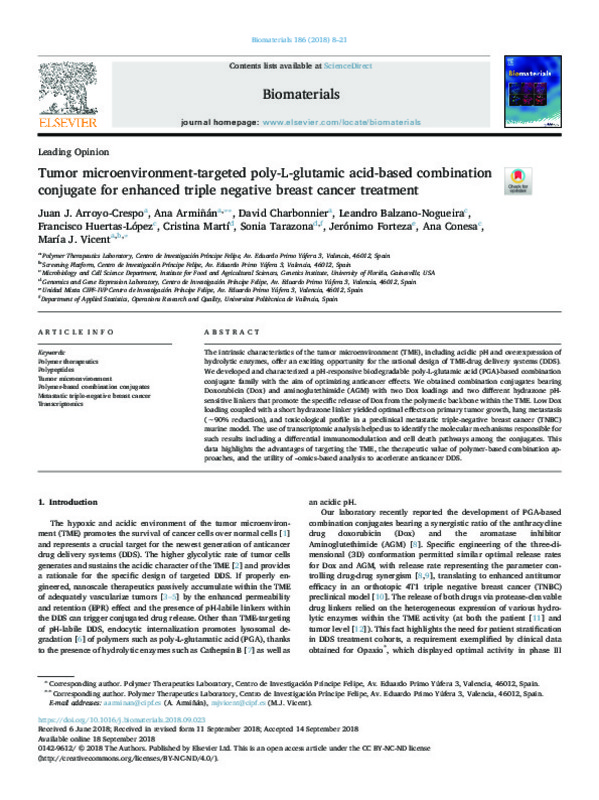Arroyo-Crespo, JJ.; Armiñán, A.; Charbonnier, D.; Balzano-Nogueira, L.; Huertas-López, F.; Martí, C.; Tarazona Campos, S.... (2018). Tumor microenvironment-targeted poly-L-glutamic acid-based combination conjugate for enhanced triple negative breast cancer treatment. Biomaterials. 186:8-21. https://doi.org/10.1016/j.biomaterials.2018.09.023
Por favor, use este identificador para citar o enlazar este ítem: http://hdl.handle.net/10251/146174
|
Título:
|
Tumor microenvironment-targeted poly-L-glutamic acid-based combination conjugate for enhanced triple negative breast cancer treatment
|
|
Autor:
|
Arroyo-Crespo, Juan J.
Armiñán, Ana
Charbonnier, David
Balzano-Nogueira, Leandro
Huertas-López, Francisco
Martí, Cristina

 Tarazona Campos, Sonia
Forteza, Jerónimo
Conesa, A.
Vicent Docon, Maria Jesus
Tarazona Campos, Sonia
Forteza, Jerónimo
Conesa, A.
Vicent Docon, Maria Jesus
|
|
Entidad UPV:
|
Universitat Politècnica de València. Departamento de Estadística e Investigación Operativa Aplicadas y Calidad - Departament d'Estadística i Investigació Operativa Aplicades i Qualitat
|
|
Fecha difusión:
|
|
|
Resumen:
|
[EN] The intrinsic characteristics of the tumor microenvironment (TME), including acidic pH and overexpression of hydrolytic enzymes, offer an exciting opportunity for the rational design of TME-drug delivery systems (DDS). ...[+]
[EN] The intrinsic characteristics of the tumor microenvironment (TME), including acidic pH and overexpression of hydrolytic enzymes, offer an exciting opportunity for the rational design of TME-drug delivery systems (DDS). We developed and characterized a pH-responsive biodegradable poly-L-glutamic acid (PGA)-based combination conjugate family with the aim of optimizing anticancer effects. We obtained combination conjugates bearing Doxorubicin (Dox) and aminoglutethimide (AGM) with two Dox loadings and two different hydrazone pH sensitive linkers that promote the specific release of Dox from the polymeric backbone within the TME. Low Dox loading coupled with a short hydrazone linker yielded optimal effects on primary tumor growth, lung metastasis (-90% reduction), and toxicological profile in a preclinical metastatic triple-negative breast cancer (TNBC) murine model. The use of transcriptomic analysis helped us to identify the molecular mechanisms responsible for such results including a differential immunomodulation and cell death pathways among the conjugates. This data highlights the advantages of targeting the TME, the therapeutic value of polymer-based combination approaches, and the utility of -omits-based analysis to accelerate anticancer DDS.
[-]
|
|
Palabras clave:
|
Polymer therapeutics
,
Polypeptides
,
Tumor microenvironment
,
Polymer-based combination conjugates
,
Metastatic triple-negative breast cancer
,
Transcriptomics
|
|
Derechos de uso:
|
Reconocimiento - No comercial - Sin obra derivada (by-nc-nd)
|
|
Fuente:
|
Biomaterials. (issn:
0142-9612
)
|
|
DOI:
|
10.1016/j.biomaterials.2018.09.023
|
|
Editorial:
|
Elsevier
|
|
Versión del editor:
|
https://doi.org/ 10.1016/j.biomaterials.2018.09.023
|
|
Código del Proyecto:
|
info:eu-repo/grantAgreement/EC/H2020/648831/EU/Towards the design of Personalised Polymer-based Combination Nanomedicines for Advanced Stage Breast Cancer Patients/
...[+]
info:eu-repo/grantAgreement/EC/H2020/648831/EU/Towards the design of Personalised Polymer-based Combination Nanomedicines for Advanced Stage Breast Cancer Patients/
info:eu-repo/grantAgreement/MICINN//CTQ2010-18195/ES/NANOFARMACOS POLIMERICOS UTILIZADOS COMO AGENTES SIMPLES Y EN TERAPIA DE COMBINACION. PLATAFORMA TECNOLOGICA VERSATIL PARA REGENERACION TISULAR Y TRATAMIENTOS ANTICANCERIGENOS/
info:eu-repo/grantAgreement/MINECO//SAF2013-44848-R/ES/POLIMEROS TERAPEUTICOS COMO AGENTES SIMPLES Y EN COMBINACION PARA EL TRATAMIENTO DE CANCER Y NEURODEGENERACION/
info:eu-repo/grantAgreement/MICINN//BES-2008-006801/ES/BES-2008-006801/
info:eu-repo/grantAgreement/MINECO//IPT-2012-0712-010000/ES/Desarrollo de un kit universal para liberación remota controlada de fármacos mediante hipertermia magnética en aplicaciones oncológicas/
info:eu-repo/grantAgreement/MINECO//BIO2015-71658-R/ES/NUEVOS METODOS PARA LOS RETOS EMERGENTES EN EL ANALISIS DE DATOS DE SECUENCIACION MASIVA./
[-]
|
|
Agradecimientos:
|
The authors would like to thank Dr. Stuart P. Atkinson for his collaboration in manuscript preparation and English revision, and Irene Borreda for essential immunohistological support. This work has been supported by the ...[+]
The authors would like to thank Dr. Stuart P. Atkinson for his collaboration in manuscript preparation and English revision, and Irene Borreda for essential immunohistological support. This work has been supported by the European Research Council (grant ERC-CoG-2014-648831 "MyNano") and the Spanish Ministry of Science and Innovation (CTQ2010-18195, SAF2013-44848-R, BES-2008-006801, IPT-2012-0712-010000, Programa I3, and BIO2015-71658-R). LBN is funded through a University of South Florida-Helmsley Foundation award. FHL is funded through NIH grant. Part of the equipment employed in this work has been funded by Generalitat Valenciana and co-financed with FEDER funds (PO FEDER of Comunitat Valenciana 2014-2020).
[-]
|
|
Tipo:
|
Artículo
|









